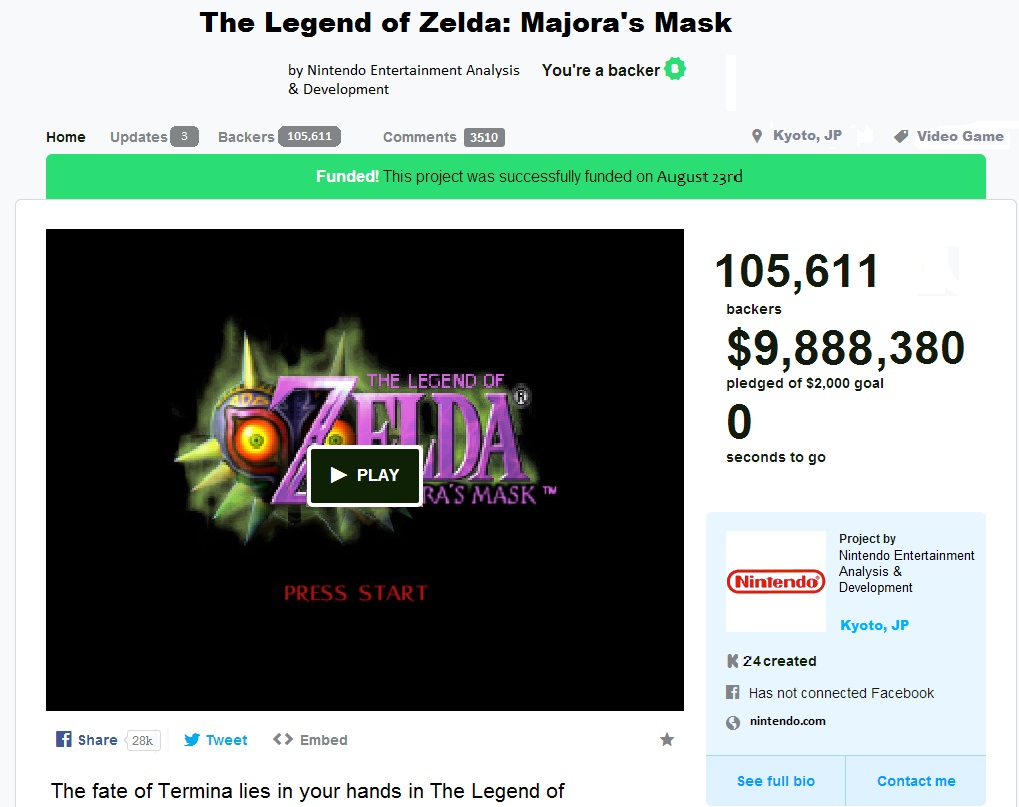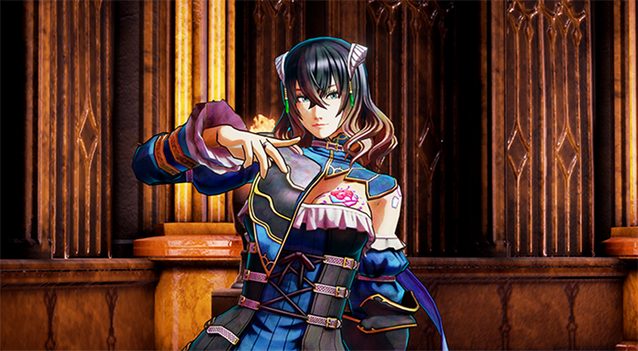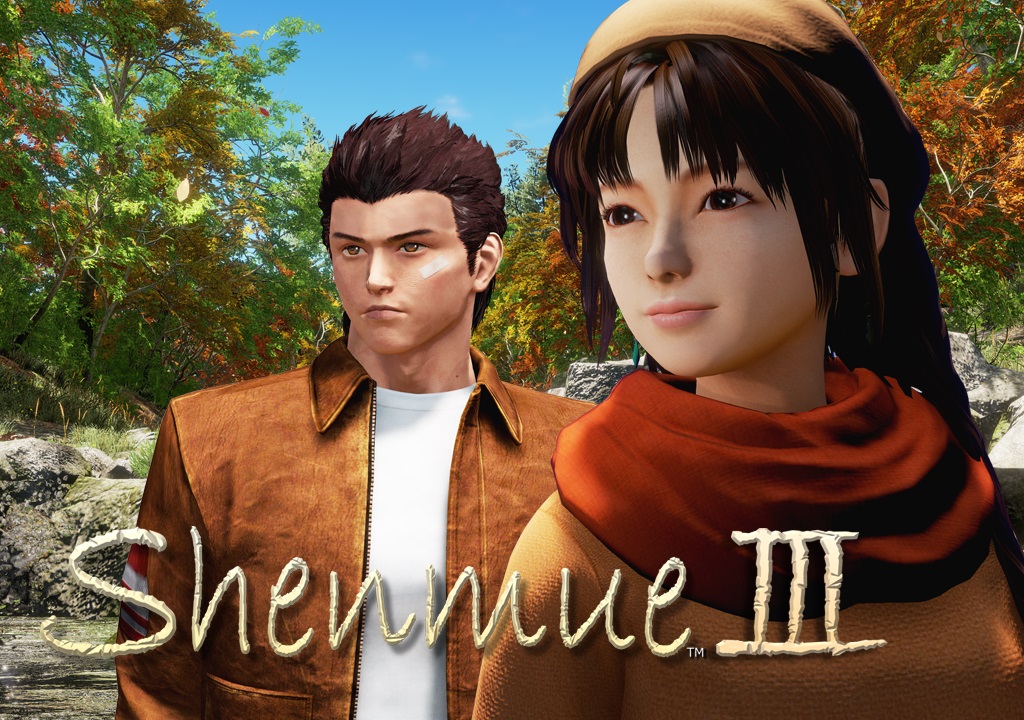Our weekly dose of hot takes, occasionally well formed opinions, and fevered outbursts is back; yup, it’s the Question of the Week! This week it’s all about the big guy. Yup, those big name developers with their big name games funding through Kickstarter. Do they belong, or should they leave Kickstarter to the little guy?
Do big name developers or games belong on Kickstarter?
 Stephanie Smith
Stephanie Smith
Just because Kickstarter is mostly populated by Indies and amateurs does not mean big names can’t use it.
It should be encouraged. When Bloodstained and Mighty No.9 appeared on Kickstarter they brought the platform hundreds of new users. Maybe it’s unfair to be going up against a big giant, but at the same it attracts new users too. When big names come to Kickstarter we get to see them for what they truly are, how much they value there backers and such. Do you think I’m ever going to support the team behind Mighty No.9 after how they treated their backers? They couldn’t even be bothered to hire a decent camera man for their documentary.
We’ve already entered this age where the average person has the resources to reach out to developers and influence what is created for better or for worse. Having more big names on Kickstarter will be good because it allows them to make games that are different. Maybe they aren’t commercial successes, but if the costs are covered that’s okay. We often see cries for more representation of overweight characters or gay characters or black characters and Kickstarter is the way to go. The truth is that muscled blue eyed adventurous guys, or huge breasted fit girls, sell well because we find them appealing. We can whine and kick and scream, but at the end of the day I’m always going to be drawn to the game with badass Vincent Valentine or Dante before I pick up a game like Sunset. Kickstarter helps passion projects happen; all developers need is the initial support of their communities. You could argue that indies already do this, but unfortunately this never makes it into mainstream media. The people whining want AAA games to embrace diversity head on and that is not going to happen without a platform like Kickstarter. It also gives us the opportunity to see sequels of our favorite games. I would be there in a heartbeat to fund a sequel to Dirge of Cerberus (come on Square) even if it’s bound to be another commercial failure. In that sense I think it’s a great way for companies to improve their relationship with fans and something they should really consider. All in all: the more the merrier.
 Marcus Estrada
Marcus Estrada
When it comes to my deepest held beliefs about Kickstarter, I do not believe that big name developers or well-known franchises should come to crowdfunding. To me, the very best thing about Kickstarter, Indiegogo, and others is that they give independent artists a chance to thrive. These people have seriously cool and intriguing ideas that deserve to be made – and they just need the money to make that happen.
Something like System Shock has such strong brand recognition that it (in my mind) does not need to seek out Kickstarter backers to be made. I’m sure investors somewhere would be thrilled to help out. But maybe that’s not really the case at all? It’s possible that the business behind getting games funded is much harder than I imagine… In that case, a Kickstarter may be warranted even when big names are in the mix.
 Laguna Levine
Laguna Levine
This is something I’ve briefly considered a few times. On the one hand, you have guys like Richard Garriott with tons of money asking fans to donate to their game in hopes of getting it made. Why does he need my money? Why aren’t investors willing to back his idea after everything he’s done in the genre? Those are always the red flags that make me scratch my head.
Then there’s guys like Raph Koster, who’s made some good games and has great ideas but has consistently been stepped on and I doubt is swimming in a gold pool (any bodily fluids released in a public swimming area don’t make it gold!). As a fan, he’s earned my respect and I’m more than understanding about why he would choose the platform.
But I’m not really nostalgic about any title developed by these guys, so maybe it’s easier to turn off my emotions on this. If it were, say, the creator of the Mother/Earthbound series, I’d possibly spend a disgusting amount of money trying to help Itoi-san out.
Logically, I’d think that someone like Itoi could raise the funds if the idea seemed sound. Earthbound in its original form was actually not that well received by Miyamoto san, and if we’ve learned anything from the Star Wars prequels, it’s that creative types still need to be challenged. He could also just open up PayPal account and let me give him my money through there, right?
However, as fan, I’d love more swag. I’d love to beta test it, give feedback, and have my name in the credits or something. It’s what we dream of as fans, right? While my head is clearly suspicious of these big name folks standing in the bread line with the people who need it, I have to admit that seeing them on that level and having them ask me to believe in them brings them down to a level that I feel I can interact with them, and that’s something I grudgingly admit makes it worth it.
If we fans want to be stupid with our money and who we believe in, let us. We hold them to different standards, but they also help ensure that there’s a high standard for the other guys to aim for. While we used to be more accepting of just a sales pitch, at least for me, these days, I expect more than art. Even video demos are getting old. I need a real demo, unless it’s an MMO, in which case I need a good plan laid out and some videos showing me what’s already complete. It might prevent some of the small guys from giving their elevator speech to the masses, but after the failures we’ve seen, I feel having a demo demonstrates that they’re more than a dreamer. Having a bigger developer leading by example at least helps the customer a bit in this sense.
 Joanna Mueller
Joanna Mueller
My knee-jerk reaction is that no, big developers or big games don’t belong on Kickstarter. They have alternative ways of acquiring funding. Most devs on Kickstarter are small teams or even a single person working on a title. They don’t have the same resources or reach to pull in sweet investor funding that a big developer has. There is also the matter of the lower bar of accountability that is, sadly, given to backers versus actual investors. If a massive title flakes out and leaves with their (usually) huge funding, backers have little recourse outside of angry internet comments.
The downside to this argument? Where do we draw the line between who is too big to crowdfund and who can still participate? If a big name dev starts his own studio after AAA success, is he appropriately indie now? What about a big IP launching a new title years after it was most relevant just because fans want it? It’s a slippery slope to be sure and maybe not one with a clear-cut answer.
 Serena Nelson
Serena Nelson
If you’ve been following my recent articles, particularly my latest Kickstarter Primer video, then you should already be aware of how I feel about having the “big name” games and personalities going through crowdfunding avenues like Kickstarter. On the one hand, they help bring attention to sites like these which might mean repeat customers. On the other hand, though, these campaigns can be quite detrimental to the smaller projects that run on or near the same time as these big guys do.
I feel that sites like Kickstarter and Indiegogo are meant for the small or one-man team projects from people that you might never have heard of. Passion projects by unknown developers should be the focus of crowdfunding campaigns, not a hype machine for the next Brian Fargo game for instance. It’s hard, especially, for niche genres to gain the attention from fans and potential backers and it makes it even harder to get funding when everyone’s throwing their money at a Bard’s Tale or Shenmue game.
With all that said, as I’ve mentioned before the “big name” projects are also titles that should have no problem being either self funded or picked up by a publisher. This subject is a double-edged sword and one that has easily cut through the more deserving titles. Too many smaller projects struggle to get money as it is without having a Tim Schafer or whomever taking some of that money away from them.
 Georgi Trenev
Georgi Trenev
There was a time when I thought Kickstarter should only be about small indies. I think I saw bigger devs using the platform as some sort of evil doers stripping away all the attention, or something along those lines. Needless to say, I was naive. In reality, I strongly believe that all types of games have a right to belong on the site, no matter their size or past history. For me, crowdfunding is only another way of financing your game, and everyone who thinks that such a method suits their development style should feel free to wear the Kickstarter hat for as long as they like.
 Josh Griffiths
Josh Griffiths
I don’t think there’s an answer to that question, not in the traditional sense. There are certainly arguments for both sides, but ultimately it’ll have to come down to individual backers and potential backers.
What would have happened if Hideo Kojima used Kickstarter for Death Stranding instead of partnering with Sony? Or Ubisoft began crowdfunding Beyond Good & Evil 2? The number of Kickstarter backers would skyrocket, and even if most of them only backed one or two other projects, it’d still be a great thing for the platform.
On the other hand, could you imagine the kind of damage it could do to other campaigns running at the same time, even beyond video games? This might be a “think of the children” argument, but I don’t think so. Not everyone has the financial means to gamble – which is essentially what crowdfunding is. A Kojima or Ubisoft game would eliminate that risk factor almost entirely, and would cast a tremendous shadow over any campaign that was unfortunate enough to launch at the same time.
You then try to rationalize it, saying the Kojimas and Ubisofts of the crowdfunding could just find a publisher, or fund development themselves. Sure, they might have to change some of their ideas or give up the rights to the property, but the game will still get made. But that isn’t fair either. Why should any creator have to sacrifice their vision if they don’t have to, or at least have a way to minimize the loss? Then you’d tell yourself that someone like Kojima would get more money with a traditional publisher than through crowdfunding, so it’s still a sacrifice. Eventually somebody’s going to ask you what’s up, call you “doc,” and you’ll suddenly realize you’re 20 feet underground, desperately unsure if the metaphor you’re trying to subtly use is working or not.
It’s unlikely a company like Ubisoft would ever use Kickstarter directly, but individual icons like Tim Schafer and Brian Fargo do it all the time. If Shigeru Miyamoto ever leaves Nintendo and decides to crowdfund a Mario spiritual successor, we’re all going to have to make some tough decisions. Let’s not pretend like that wouldn’t get fully funded in its first 30 minutes, but is that a bad thing? Well, I don’t think there’s an answer to that question, not in the traditional sense.
 Bryan Rumsey
Bryan Rumsey
This is very much a grey issue. Everyone on a development team needs to be paid so they need to find funding somehow. Big name developers have the option of getting a publisher but that usually results in some sort of compromise from the original vision. Crowdfunding should be available to them as well as a way to finance their game without publisher oversight. However, these development teams usually have better PR access and can create flashier campaigns than smaller teams. This usually results in an unintended “raising of the bar” for what constitutes a “good” campaign. This ultimately hurts smaller teams who don’t have the funds or resources to create AAA level campaigns but definitely have the skills to create that amazing game they are trying to fund.
 Dan Miller
Dan Miller
While Kickstarter may not have been set up with big organisations and professionals in mind, I see no reason why they should be excluded. Half of the appeal of backing videogames on Kickstarter is following development through the various updates and feeling involved in the process; it’s not just the funding element. Plus when a big developer fails to deliver on their promises it’s always fun to watch them wilt under the angry vitriol of their backers (who are more forgiving of amateur projects). I do understand the concern that the big developers don’t necessarily need the money in the same way the smaller studios and indie developers do, but if at allows them to create more innovative and fun games that aren’t constrained by the demands of their publishers then just further benefits gamers.
 Felix Wong
Felix Wong
Maybe big-time developers shouldn’t be begging for funds on a crowdfunding platform, given how much money cash-cows like Bungie make already—but that doesn’t mean I don’t want them on Kickstarter. I think it might be a good idea for rich AAA developers to negate the launch date fee should a backer pledge an amount above a certain tier, much like indie developers. For example, I’d be down to give Rockstar $100 for a Red Dead Redemption sequel provided I receive some kind of in-game or physical reward and I don’t have to pay an additional $70 for the game when it releases.
Have a question you’d like our panel to answer? Post it below, or email greg@cliqist.com with your most pressing crowdfunding questions! If you’d like to check out some of our previous Questions Of The Week, then go right ahead!

















If anyone wants to fill me in on what that Josh idiot, was saying, please let me know.
I had a couple interesting discussions about this on Facebook when I shared the link. Suffice it to say that this is not a question with an easy answer. There are pros and cons towards having a “AAA” level title on Kickstarter and I will admit that it was one that got me into the site to begin with.
[…] see AAA games being funded through Kickstarter as the catalyst to this trend. A couple of weeks ago our staff gave their opinions regarding larger developers using crowdfunding and I mentioned that the campaigns of larger games raised the bar for smaller games. Buzzwords are […]